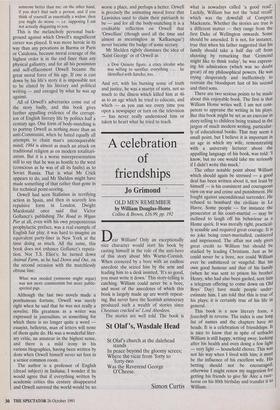A celebration of friendships
Jo Grimond
OLD MEN REMEMBER by William Douglas-Home Collins & Brown, £16.99, pp. 192 Dear William! Only an exceptionally nice character would start his book by casting himself in the role of the anti-hero of this story about Mrs Warne-Cornish. When cornered by a bore with an endless anecdote she seized him by the arm and leading him to a desk insisted, 'It's so good, you must write it down.' This story-telling is catching. William could never be a bore, and most of the anecdotes of which this book is largely made up are worth repeat- ing. But never have the Scottish aristocracy produced such a wealth of stories since Chestnuts cracked wi' Lord Aberdeen.
The stories are well told. The book is what is nowadays called 'a good read'. Luckily, William has not the 'total recall' which was the downfall of Compton Mackenzie. Whether the stories are true is a different matter — they range from the first Duke of Wellington onwards. Some should be amended. It is not, for instance, true that when his father suggested that his family should take a half day off from shooting by remarking that `Grimond might like to think today', he was express- ing his admiration (which was no doubt great) of my philosophical powers. He was trying desperately and ineffectively to restrain the bloodsport lust of his second and third sons.
There are two serious points to be made about this enjoyable book. The first is that William Home writes well. I am not com- petent to appraise the writing in his plays. But this book might be set as an exercise in story-telling to children being trained in the jargon of much modern writing, particular- ly of educational books. That may seem a small point, but I believe it is important in an age in which my wife, remonstrating with a university lecturer about the appalling language of his book, was told: 'I know, but no one would take me seriously if I didn't write this muck.'
The other notable point about William which should again be stressed — a good deal has been written about it, not least by himself — is his consistent and courageous view on war and crime and punishment. He fought against unconditional surrender. He refused to bombard the civilians in Le Havre. Some people — for instance the prosecutor at his court-martial — may be inclined to laugh off his behaviour as a Home quirk. It was morally right, practical- ly sensible and required great courage. It is no joke being court-martialled, cashiered and imprisoned. The affair not only gives great credit to William but should be studied by leading Christians. Just as he could never be a bore, nor could William ever be embittered or vengeful. But his own good humour and that of his family (when he was sent to prison his brother Henry, who had also been gaoled, sent him a telegram offering to come down on Old Boys' Day) have made people under- estimate him. I am told that this is true of his plays; it is certainly true of his life in general.
This book is a new literary form, a festschrift in reverse. The index is one long list of names and the chapters have no heads. It is a celebration of friendships. It is nice to know that in spite of setbacks William is still happy, writing away, looking after his health and even doing a few light — very light — household chores. This was not his way when I lived with him; it must be the influence of his excellent wife. His betting should not be encouraged; otherwise I might renew my suggestion for getting his friends to give Sir Alec a race- horse on his 80th birthday and transfer it to William.








































 Previous page
Previous page